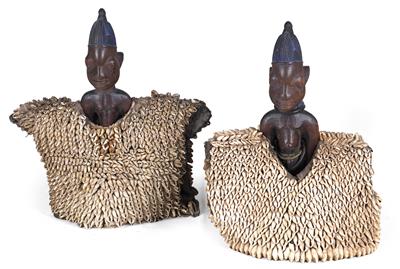Yoruba, Nigeria: a pair of ‘ibeji figures’ (two items), with capes inlaid with cowrie shells. Style: Saki, Oyo.
Yoruba, Nigeria: a pair of ‘ibeji figures’ (two items), with capes inlaid with cowrie shells. Style: Saki, Oyo.

Among the Yoruba in Nigeria twin births are common, and twins are regarded as something special. They have their own god, ‘Ere Ibeji’, and are considered to bring good fortune and blessing to their family. The Yoruba believe that twins only have one soul between them. Therefore, when one of the twins dies, such a ‘proxy figure’ must be rapidly carved. This guarantees that the soul of the surviving twin is complete again. These figures are called ‘ibeji’.
The present pair of ‘ibeji’ figures are both male, are carved of lightweight wood, and coloured dark brown. Their high plaited coiffures are blue, through so-called ‘bluing’ (‘Rickett’s Blue’), an early washing agent. Both figures are very finely crafted in the typical style of Saki from the region of the town Oyo and are decorated on the neck (one object) and hips (both objects) with chains of coloured glass beads. Both figures have no damage and a good, old patina.
Additionally, both ‘ibeji figures’ wear capes of fabric, which are richly adorned with pierced and sewn cowrie shells (which are regarded as a sign of wealth and prosperity).
Height: c. 27 cm (the ‘ibeji figures’); width: 31 cm and 27 cm (the capes). First half of the 20th century. (ME)
Provenance: Austrian private collection.
Lit.: ‘Ibeji. The Cult of Yoruba Twins’ by George Chemeche, ill. 17, 20, 24.
Esperto: Prof. Erwin Melchardt
 Prof. Erwin Melchardt
Prof. Erwin Melchardt
+43-1-515 60-465
erwin.melchardt@dorotheum.at
06.04.2017 - 15:00
- Prezzo di partenza:
-
EUR 2.600,-
Yoruba, Nigeria: a pair of ‘ibeji figures’ (two items), with capes inlaid with cowrie shells. Style: Saki, Oyo.
Among the Yoruba in Nigeria twin births are common, and twins are regarded as something special. They have their own god, ‘Ere Ibeji’, and are considered to bring good fortune and blessing to their family. The Yoruba believe that twins only have one soul between them. Therefore, when one of the twins dies, such a ‘proxy figure’ must be rapidly carved. This guarantees that the soul of the surviving twin is complete again. These figures are called ‘ibeji’.
The present pair of ‘ibeji’ figures are both male, are carved of lightweight wood, and coloured dark brown. Their high plaited coiffures are blue, through so-called ‘bluing’ (‘Rickett’s Blue’), an early washing agent. Both figures are very finely crafted in the typical style of Saki from the region of the town Oyo and are decorated on the neck (one object) and hips (both objects) with chains of coloured glass beads. Both figures have no damage and a good, old patina.
Additionally, both ‘ibeji figures’ wear capes of fabric, which are richly adorned with pierced and sewn cowrie shells (which are regarded as a sign of wealth and prosperity).
Height: c. 27 cm (the ‘ibeji figures’); width: 31 cm and 27 cm (the capes). First half of the 20th century. (ME)
Provenance: Austrian private collection.
Lit.: ‘Ibeji. The Cult of Yoruba Twins’ by George Chemeche, ill. 17, 20, 24.
Esperto: Prof. Erwin Melchardt
 Prof. Erwin Melchardt
Prof. Erwin Melchardt
+43-1-515 60-465
erwin.melchardt@dorotheum.at
|
Hotline dell'acquirente
lun-ven: 10.00 - 17.00
kundendienst@dorotheum.at +43 1 515 60 200 |
| Asta: | Tribal Art |
| Tipo d'asta: | Asta in sala |
| Data: | 06.04.2017 - 15:00 |
| Luogo dell'asta: | Wien | Palais Dorotheum |
| Esposizione: | 01.04. - 06.04.2017 |
